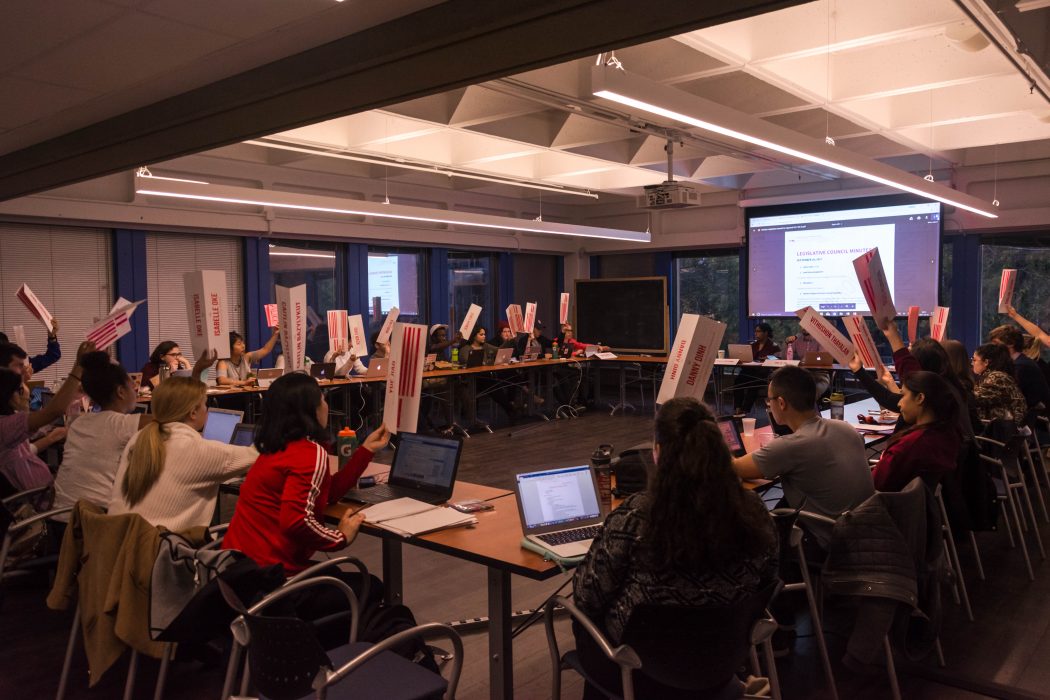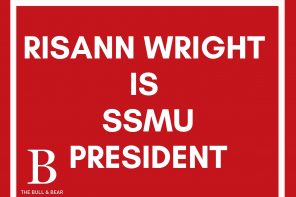On October 19, the Students’ Society of McGill University’s (SSMU) Legislative Council meeting began with presentations about student housing, improvements to the library, and pitches from student union groups UEQ and AVEQ. The tone of the meeting changed quickly when the executive team stated their dissatisfaction with the performance of SSMU President Muna Tojiboeva.
A Statement of Non-Confidence
In the Announcement portion of the Council’s agenda, VP Student Life Jemark Earle read a statement from five SSMU executives, which communicated their non-confidence in Tojiboeva.
“As we cannot trust the President to adequately act as a spokesperson, the executive recommends that the President step down from her role as the spokesperson of the Society,” Earle said.
Earle pointed to the issue of a lack of transparency and communication on the part of Tojiboeva on decisions that concern the executive. “The executive received several questions from the media regarding information that the rest of the executives were not privy to or had understood to be confidential,” Earle maintained.
The statement acknowledged student-led movements that aim to resolve transparency issues within the SSMU, emphasizing the executive team’s commitment to addressing these issues.
“We invite the students partaking in these campaigns to remain part of the political process and encourage them to keep pushing forward the conversation surrounding institutional reforms in order to make the SSMU more accessible and transparent to its members,” he remarked.
The President Responds
Tojiboeva responded to the statement from the executive team by pointing firstly to the SSMU Constitution, which she stated mandates the President to be the spokesperson of the Society.
“Every single time that I communicated to the media, I was met with comments from the executives saying that I did not represent their viewpoint,” Tojiboeva said. “I am not here to represent the viewpoints of the executives. I am here to represent the viewpoints of all [the undergraduates] at McGill.”
On the accusation of a lack of transparency and poor communication, Tojiboeva stated that she has worked to make sure that the Board of Directors minutes are published to the SSMU website in a timely manner, in contrast with past Boards which never posted them at all. In response to Earle’s specific assertion about communicating information to the media about the Board of Directors meeting on October 15, at which Arisha Khan, the Vice President Finance, was suspended from the Board for a two-week period following a breach of confidentiality, Tojiboeva noted that she motioned for the minutes of that session to be made public.
“Everything in the confidential session that happened on [October 15] is now public information. That is why it was communicated to the media,” Tojiboeva said.
Tojiboeva also accused some on the executive team of engaging in workplace harassment and bullying. She referred specifically to instances of body shaming and attacks on her political views, though she did not clarify the details of the latter.
“One of the executives [told me], ‘Wow, you’re very skinny.’ That is a rather awkward comment to make, so I said, ‘Thank you,’” Tojiboeva remarked. “However, the response of the executive in question was, ‘That was not a compliment.’”
Tojiboeva described an environment of workplace hostility that she claims has continued for several months.
“I was, multiple times, called an ‘opportunist’ […], and every single time I tried to do my job, I was either met with snide comments, or comments about my qualifications,” Tojiboeva said. “I think it is unfortunate that now, because the executives disagree with my opinions, they choose to air their dirty laundry and continue this problematic relationship at work.”
Support from the Gallery and Council
Tojiboeva received significant support from members seated in the gallery and many on the Council itself. During question Period, several of these members highlighted the work that Tojiboeva has done as President, and questioned the treatment that she has endured.
Those in the gallery objected to what they saw as an attempt to undermine a democratically elected President by a politically motivated executive team. One such member identified herself as Julia, from the Faculty of Arts.
“We’re really hearing from a very loud minority, and we have this whole silent majority that really represents the vast majority of the body of the membership of SSMU,” Julia said. “Don’t [the executives] feel that [they are] really undermining SSMU by failing to represent the majority […]?”
VP External Connor Spencer, who fielded most of the questions concerning the statement of non-confidence, offered a response that spoke primarily to the accessibility of Legislative Council: “Most likely, the people in this room are not the silent majority by the fact that they’re here and they’re speaking,” Spencer said. “I would hesitate to say that those of us that have this space accessible to us are the silent majority […] We wanted to make a simple statement and move on.”
Another Arts student, Mikaela, asked “why the executive was subjecting the President, a woman of color, to bigoted violence,” referencing the mistakes of last year’s SSMU executive and drawing a comparison. In response, VP Spencer suggested that Tojiboeva file an Equity Complaint because those claims, while “strong and intense, don’t deserve a response in a space like this.”
In response to other questions from the gallery, Spencer said that the purpose of the statement from the executive team was not to impeach Tojiboeva, but rather to voice their frustrations on the issue of transparency.
“Just to be clear, we’re not trying to remove Muna from her position. We’re trying to make clear our concerns about the transparency of our student governance,” Spencer said. “If decisions are not transparent to [the executive], then they’re also not transparent to the members.”
Other Business
Following the conclusion of question period, the Legislative Council discussed the Bike Centre and affiliating with AVEQ or UEQ. Council voted to send a referendum question regarding the creation of the Bike Centre to the student body. Notably, however, the question of AVEQ affiliation was tabled to allow for further consultation with the faculties, which several councillors voiced was necessary. Because the deadline for submitting questions to the Fall Referendum will have passed by next Council, the motion to allow for further consultation effectively pushed the question of affiliating with the student union to next semester, providing the movers of the motion choose to pursue it again.









3 Comments